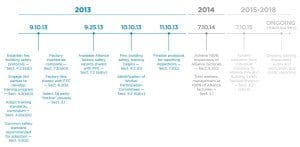Sourcing to low cost destinations is not a new development and Bangladesh has been a favored destination of apparel brands and retailers. But incidents like Rana Plaza disaster (an eight-story factory collapsed, killing over 1,000 workers) brought to light non-existent safety measures. This incident, and three others during 2013-14, challenged the sourcing strategies of large apparel brand retailers and compelled them to embrace socially responsible procurement processes.
Almost all brands that source from Bangladesh belatedly saw a need to help ensure worker safety in the factory. Companies like Wal-Mart and Macy’s report their progress in this area in their annual sustainability reports. Two initiatives in this area include “Alliance of Bangladesh Worker Safety” and Accord on Fire and Building Safety in Bangladesh.”
According to the Bangladesh Garment Manufacturers and Exporters Association (BGMEA), in 2013-14 there were 4,222 garment factories in Bangladesh, employing a workforce of ~ 4 million. Over 80 percent of Bangladesh’s exports are of readymade garments (RMG). The total value of the exports was approximately $24.5 billion, contributing 13.5 percent to the country’s GDP.
The Accord was founded by a group of over 190 apparel brands, retailers and importers from Europe, North America, Asia, and Australia. It also includes two global trade unions, eight Bangladesh trade unions, and four NGO witnesses. The Accord covers 1,583 factories representing around 2 million workers.
The Alliance for Bangladesh Worker Safety was founded by a group of North American apparel brands and retailers and consists of 26 brands who have joined forces to make an attempt to improve safety in Bangladesh’s readymade garment factories. The Alliance releases compliance information for more than 648 factories representing an estimated 1.2 million workers.
Both the initiatives have a five years roadmap to improve the conditions of Bangladesh’s factories.
The Alliance and Accord conduct assessments using the Alliance’s Fire Safety and Structural Integrity Standard and Accord Building Standards. The standard covers three areas – fire, electrical and structural integrity. This standard is at par with the standards used by the National Tripartite Committee. The two associations work with seven local qualified assessment firms that conduct the audits on their behalf. The payment to the auditor is done by an Alliance/Accord member working with the factory. If multiple members work with the same factory, they divide the assessment cost accordingly.
Milestones for 5 Year Commitments of the Alliance
The audit report focuses on three aspects of the factory: Fire Safety, Structural Integrity and Electrical Repairs. All the three audit reports have a general information section with details like ownership, number of occupants, construction type, and height of the building area.
Fire assessment details are verified on the criteria of Fire Protection Construction; Fire Protection Systems installed; and Fire Safety Programs.
Structural assessment deals with Structural System Design; Structural System Construction; and Structural Safety Programs.
Electrical assessments are based on Electrical System Information; Electrical System Maintenance; current Electrical System Conditions; Emergency Power System; and Lightning Protection System. In addition, the assessments are also based on worker interviews, and union representatives (where present) interviews.
After the factory inspection, an audit report containing Corrective Action Plans (CAPs) is drafted. All CAPs are dynamic documents with remedial plans that evolve and change as the individual member companies and qualified assessment firms (QAFs) work with each factory owner and management. Together they come out with detailed plans of action with clear timelines and a financial plan sanctioned by each party. During the first round of audits, factories that were non-compliant were shut down. In addition to improving fire and building safety in Bangladesh’s garment factories the two associations have developed Basic Fire Safety Training modules for employees. More than one million workers are trained on basic fire safety.
Though it is debated why two associations of a similar nature are needed, these organizations are benefiting the employees in many ways. Nevertheless, the two initiatives together cover the safety of approximately 80 percent of the RMG work force in Bangladesh.
Retailers and brand owners who wish to be socially responsible and protect their reputations need to:
- Get involved directly in choosing the contract manufacturers.
- Avoid relying upon a third party agency to help with sourcing. They may be involved in unethical subcontracting.
- Only hire organizations who participate in audit reports for safe factories and measures for worker safety. Organizations like The Alliance for Bangladesh Worker Safety can help in identifying such organizations.
In conclusion, ARC Advisory Group is interested in producing a list of most sustainable supply chains in the world. If you have a comment or suggestion on what metrics need to be developed to select highly sustainable supply chains, please write to nsing@arcweb.com.


















Leave a Reply